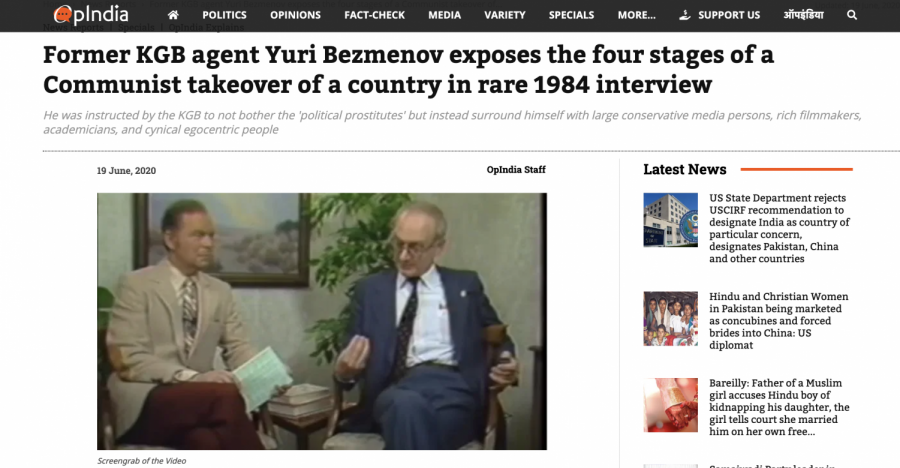Russian interference: Not just a modern issue
Columnist Eli Erickson delves into archive footage of an interview with a former KGB Officer
This photo shows the website and video featured in this article.
Ever since the 2016 presidential election that saw Donald Trump admitted into office, headlines in multiple news outlets have raised the concern that Russia interfered in the election. Beyond this, there have been growing concerns over Russia using subversive warfare and infiltration through the World Wide Web, as well as being a party responsible for motivating terrorist attacks in our nation.I would like to cast a bit more light upon the source of many of our fears and hostile behavior regarding Russia – namely, our historical conflict with them as the Soviet Union during World War II and the Cold War.
In researching the issue, I found good information in an insightful interview with a defector from the Soviet Union’s KGB (or, as translated in English, the Committee for State Security), Yuri Bezmenov succeeded in fleeing to the United States from India and spoke with American Media Incorporated in 1984 about how the Soviet Union would subtly take over countries from within and bring them to heel. This interview was recently re-posted and analyzed on Opindia – an opinion site based in India.
The government would target foreign countries that they wanted to take over or influence. In the interview, Bezmenov details how the Soviets would divide people in those countries who held any appreciable capability towards swaying public opinion. They would analyze people as unlikely as barbers and taxi drivers and divide them into two groups – those who supported their goals, and those who didn’t. Those who supported their goals would have media and public perception swayed in their favor, granting them power in return for their loyalty. Those who didn’t agree with the government were assassinated – either in the form of destroying their credibility or reputation, or literally by killing them. One example Bezmenov provides illustrates this tactic during the Vietnam war. In the course of one night in the town of Hue in South Vietnam (which, for context, had been captured by the Vietkong only a couple of days before), thousands were dragged out of their homes, loaded into vans, and slaughtered by the communist infiltrators within that community. Thanks to a tightly-knit group of informants who were able to provide the infiltrators with personal information about dissenters, they were able to quickly and quietly abduct and dispose of them swiftly and efficiently.
Bezmenov also recounts the various pawns that the Soviets utilized in their efforts to undermine countries, like India, from within. These included several pro-Soviet journalists in India who idealistically espoused for the rise of socialism within India – people that Bezmenov had deemed friendly acquaintances. To his horror, he found these people were due to be disposed of due to knowing too much. “You see, the useful idiots, the leftists, idealistically believing in the beauty of Soviet socialist or communist or whatever system… when they get disillusioned, they become the worst enemies,” said Bezmenov. His own KGB instructor told him to ignore these “political prostitutes,” in favor of worming into and subverting the media sources and people who held more conservative points of view. He was to target wealthy filmmakers, intellectuals and academic circles, the cynical, and those who would be easily blinded by their egotism and greed. He was told to aim for people who “lacked moral principles” as they were the easiest to recruit due to their willingness to sell out their own nation in favor of personal power.
Additionally in the interview, Bezmov provides some insight regarding his reasons for defection, the difficulties that came with it, and the true purposes and motivations of the KGB. Finally he explains four “steps” that would subjugate a nation from the shadows.
The first step was “demoralization.” This process could take fifteen to twenty years and involved exposure to the Soviet ideology upon the impressionable minds of at least three “generations” of students in the academic/educational scene. This step involves teaching ideology to students without challenge or objection. As a result, these people grow up to become the ones who lead the country by virtue of example, holding positions of power in media and politics. This conditioned mindset accepts the Soviet way of life and thinking as the undisputed truth which opens the door for Soviet infiltration to truly take hold.
After this, the second stage, “destabilization”, begins. It is a process that takes far less time – two to five years- and is reliant on the manipulation of the nation’s economy, relationships with other nations, and national defense. The given nation will infiltrate, subvert, and undermine these three areas of interest, collapsing them from within before taking hold of them.
The third stage, “crisis,” can take as little as six weeks. In this stage, the nation is completely thrown into turmoil- as the name implies. A nation is thrown into complete chaos, allowing what little reason and logic that may remain after the process of demoralization to evaporate in the wake of the ensuing anarchy. This approach leaves the shaken and scatter-minded people too broken in both body and spirit to truly resist or see through the impending takeover.
And this is when the fourth and final stage, “normalization”, comes in. This is when the Soviets are actively and openly in control of the nation- military units and Soviet-enforced laws are instituted in the nation without question as the country is now effectively another constituent of the Soviet Union.
At this time in American History, I think it is important for citizens to understand the reason there is concern about Russian interference in American politics. It is also important to hear Brezmenov’s interview to understand these tactics when we see them in our own country. While it is half an hour long, I strongly urge you to watch the entire thing, not only because of current politics, but for its historical value.
This article barely scratches the surface of the contents of the actual interview, which I have provided here.






